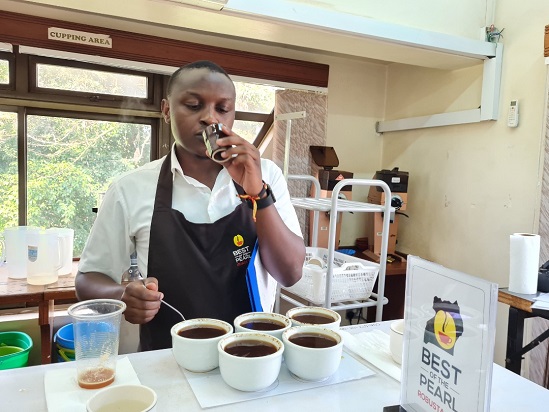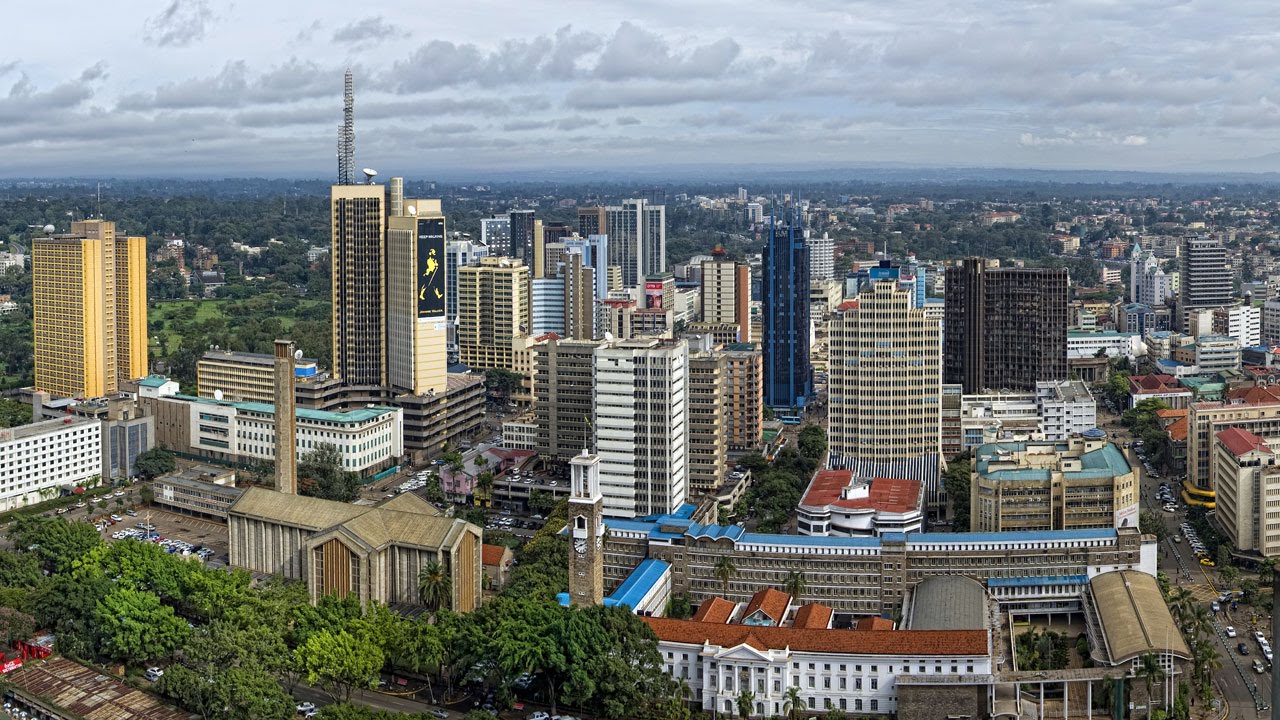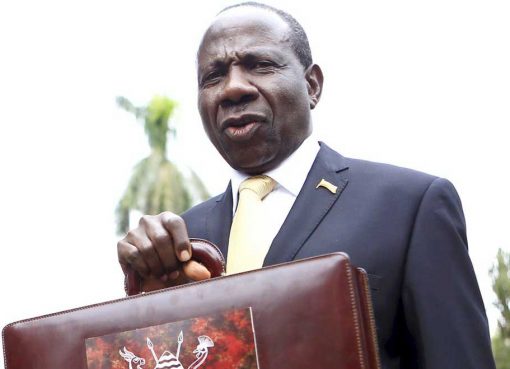Clare Rwakatogoro with her fellow cup tasters Fidel Bakomeza (left) and Raphael Wafoyo (C) during the Specialty Arabica Coffee cupping finals on 27 October 2021
Coffee has endless flavour notes. These may not be obvious to the ordinary coffee drinker but can be experienced through a coffee tasting technique called coffee cupping or cup tasting. This is a quality control method and an excellent way to increase your knowledge about coffee. Tasting helps you learn how to identify differences between coffees in a country of origin as well as the differences between coffees from different countries. In this article, we take you through the process Uganda Coffee Development Authority (UCDA) uses to identify the qualities of coffee in a cupping session.
UCDA’s Directorate of Quality and Regulatory Services checks the quality of and profiles the coffee produced in Uganda.
In addition, UCDA annually organizes coffee competitions where the best coffees are identified through cup tasting. According to the UCDA Promotions and Training Officer, Clare Rwakatogoro, these cupping competitions have included the Taste of the Harvest competition, the Best of the Pearl Arabica and Robusta competitions and, more recently, the Uganda Specialty Arabica Coffee Competition.
“Coffee cupping is a process in which coffee is tasted by producers and buyers around the world to check the quality of a batch of coffee,” Rwakatogoro says. “In cupping, coffees are scored for aspects such as cleanness, sweetness, acidity, mouthfeel and aftertaste.”
A coffee cupping competition at UCDA starts off with a call for coffee samples. The Authority invites coffee producers to send samples to the UCDA laboratory. The samples are then subjected to green grading (a process which is used to identify any defects in the coffee). This initial stage determines whether the coffee should be tasted or eliminated from the competition. If the coffee has several defects it is eliminated from the very beginning.
Cupping involves a descriptive analysis of the coffee itself. This analysis determines the character of the cup (the profile of the cup, the intensity of the cup, the sweetness of the cup and then the overall impression of the cup).
UK-Uganda Coffee Competition
On 27 October 2021, UCDA, in partnership with the Uganda High Commission in London and the British High Commission in Kampala, held the inaugural UK-Uganda Specialty Arabica Coffee Cupping competition. The UCDA call for samples attracted 52 samples. This according to Rwakatogoro is the highest number of samples ever received for a cupping competition. This, she says, is an indication of how much the coffee producers value the competitions.
“These coffee competitions give small holder farmers or producers of microlots an opportunity to be appreciated and rewarded for the effort they put in,” she says. Microlots are special lots of coffee, selected for their high quality and unique flavour profiles that are produced within larger farms, grown in limited quantities and picked and processed entirely separately from the rest of the farm’s coffee.
Peter Bwengye, a Quality Assurance Officer at UCDA explains briefly what the samples went through to qualify for the Specialty Arabica competition.
“The 52 samples were graded and cupped. We selected 18 samples that went to the next round. Out of the 18 samples we needed 6 to simultaneously cup with a team of judges from the UK on the competition day. It is from the 6 that the winner of the competition, Bros Coffee Limited, was chosen,” Bwengye says.

Procedure
Bwengye says that a single cupping session lasts about 45 minutes. But the process involved is quite complex. The cuppers weigh and grind 8.25g of freshly roasted Arabica coffee samples which is infused with 150mls of water in each cup. This is repeated 3 or 5 times depending on the quantities for each sample. Each sample has the same number of coffee cups tasted but it is always an odd number.
A cupper then pours the hot water into the ground coffee. The water must be clean with specific standards to ensure that no chemical contaminates the profile of the cup.
“Water in essence also has an impact on how coffee reacts,” Bwengye explains, adding, “We boil the water to 100 degrees and then put it to a fragrance test which involves aromatic testing.”
This, he explains, is using the nose to determine the character of the coffee.

By doing this, a cupper picks out the few outstanding attributes which he or she then notes down. Bwengye explains that when water is infused in the coffee the cupper determines the wet fragrance or what is commonly called aroma. The aroma reveals different attributes that are usually within the coffee.
The next step is to do the cup tasting which involves slurping a spoonful of coffee from each of a set of 3 or 5 cups of each sample.
As they slurp, the cuppers look out for various attributes including flavour, aftertaste (the taste that remains on your tongue), body (weight and texture of the coffee on the tongue) and acidity. Coffee naturally has about 4 types of acid. If the coffee is citrusy as is the case in Arabica, that is good acid. The cuppers make a point to determine the intensity of the acid – a good coffee will balance the level of acid.
Another attribute to look for is the uniformity of the cup. If coffee is processed well right from the farm, one should get a uniform cup. Then they look at sweetness of the cup before giving a general impression of the cup and how all the attributes come together. Ideally no attribute should overshadow the others.
“The coffee must be of specialty grade to participate in the competition. Any coffee that is below 80 is automatically eliminated,” he asserts.
Within the specialty coffees a cupper looks for the unique and complex ones.
“Those are the two key words that we look out for. Unique and complex,” Bwengye says. “There are different methods involved but all of them come down to one thing – is the coffee specialty or is it not. And if it’s specialty, is it unique or complex?”
Ultimately, for a coffee to be considered a specialty coffee and therefore qualify for the competition, it must score 80 and above, Bwengye concludes.






Quality coffee.